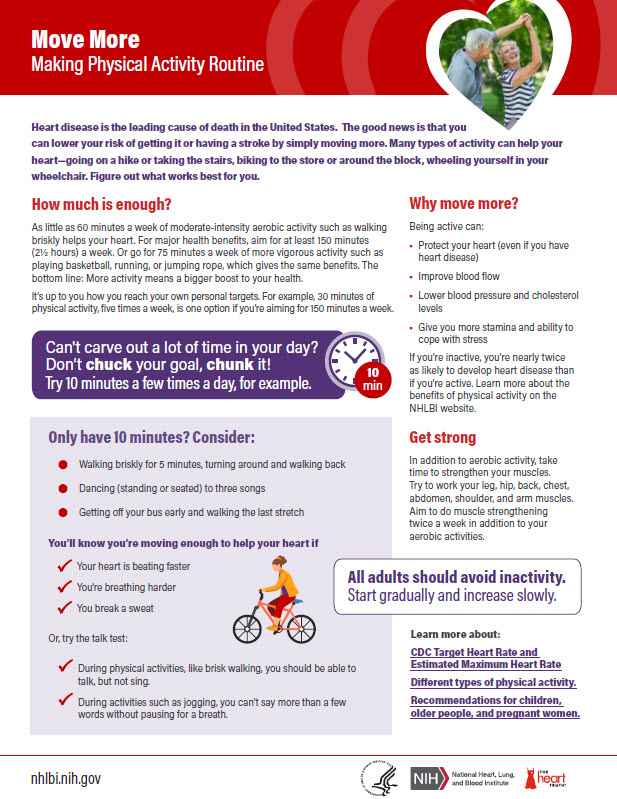February is National Heart Month
We had a moment to discuss heart month with Dr. Farley and she was bursting with heart information for us to share with you. Below are some of the items she really wanted everyone to have. Happy Heart Month!!
Move more – Making Physical Activity Routine
I found this fact sheet called Move more – Making Physical Activity Routine. It is a great fact sheet for everyone – rather you are a regular exerciser or more sedentary. Download full version here.
To get the most health benefits from exercise and physical activity, you have to work up to higher intensity levels.
But, all physical activity counts!
And, it doesn't have to feel like exercise all the time! Overcoming inactivity is more important than what you do! Start by broadening what activities you do and do to more of what you love or have stopped doing. It doesn't have to be structured exercise!
Just get up and move. Then, try new things, set goals, get outside more, play games, and help out with everyday chores.
Gradually you can build in more structure and intensity. Click on this link for guidelines about intensity for adults or adults aged 65 year or older.
But there is MORE!
Did you know that aerobic exercise is fundamental to a PD exercise program? Heart health not only benefits strength, blood flow, blood pressure, and mental well-being, but brain health benefits may delay aging and neurodegenerative disease!
Yes, aerobic exercise not only provides brain and body benefits but to date, it provides the most promising approach for slowing Parkinson disease progression -- and it is available to you right now! So, here are fun facts about heart health and Parkinson disease that I hope you will find "invigorating."
-
Persons with a history of working out at a moderate to vigorous level in their midlife (i.e., 40-60 years) have a lower risk of developing Parkinson's disease. This suggests it is "neuroprotective" and may put off or slow neurodegenerative disease processes.
-
At the time of diagnosis, individuals who are already habitual exercisers have a more robust dopamine system at baseline than sedentary individuals at diagnosis. Brain imaging studies showed habitual exercisers had more connectivity in the dopamine system in motor and cognitive pathways, more efficient release of available dopamine, better quality of life, and less severe motor and non-motor symptoms related to bradykinesia, motivation and function.
-
But if you are more sedentary, don't worry. Longitudinal studies have shown that sedentary individuals can achieve those same quality of life benefits even if they start after diagnosis!
-
In 2017, the first Phase 2 study was published to find out if newly diagnosed, sedentary, unmedicated individuals (n=128) could safely exercise at adequate intensity levels, adhere to the protocol for 6 months, and show less worsening of motor symptoms! They compared two different intensity levels (high-intensity vs. moderate-intensity with a sedentary (non-exercising) group and showed high-intensity exercise was safe and more effective at preventing the worsening of motor symptoms than the moderate-intensity program.
-
This Phase 2 study was the pilot data needed for the same authors to apply for a Phase 3 clinical trial. This Phase 3 (SPARX3) study was recently highlighted in Parkinson's News Today They are now recruiting for a larger number of participants (n=370), ages 40—80, diagnosed with PD in the last 3 years that have not yet started PD medications. The SPARX3 study aims to expand upon the Phase 2 findings by following people for 18-months and including additional measures of mobility, cognition, quality of life and brain imaging to assess short- and long-term evidence for delaying the motor deterioration of PD. The good news is the study will be taking place in 27 clinical trials in the US and 2 in CA. If you are interested in participating, detailed information about the study and the location of research sites can be found here . Be part of one of the most important exercise studies yet to determine the importance of aerobic exercise to benefit neurodegenerative disease progression in PD!
Not sure you want to participate in a clinical trial but want to know how to get started?
Or need a plan for increasing your intensity? Consider a wellness consult from one of our exercise professionals.


Our goal is to make sure you’re always empowered and informed.
We offer handouts, downloads, research updates, Wellness Series talks, retreats with knowledgeable speakers, in-person and virtual wellness consultations, and in-person physical therapy visits. We are here for our PWR! Members every step of the way.
We’re excited to have you join us!
The Move More Health Sheet is a resource
provided by nhlbi.nih.gov here
Dr. Becky Farley About the Author
If you ask her, Dr. Becky Farley will tell you that working with her first client with Parkinson’s almost 20 years ago changed her life and her career, and since then she hasn't stopped changing lives of those living with Parkinson's, in Arizona and the rest of the world. In 2010, she established the PWR!Gym in Tucson and has been offering people with Parkinson disease the PD-specific physical therapy, group exercise, and social engagement they need to get better and stay better. Globally, Dr. Farley supports PWR!’s mission of making cutting-edge PD-specific "exercise as medicine” available to the 10 million people living with PD worldwide, by training healthcare and fitness professionals in the PWR!Moves and the PWR!4Life model (and she’s trained over 6000 professionals since she started in 2010!).
When she’s home in Arizona, you’ll find Becky working on PD-specific exercise at the PWR!Gym as well as leading our annual exercise intensive PWR! Retreats. When she’s on the road, she’s either teaching our PWR!Moves workshops or giving talks at conferences, community organizations, and healthcare networks across the US and world.
When she isn’t working, you can find her working out, walking the dog, and gardening. To learn even more about Dr. Farley, visit our team page.

You can find Dr. Farley at:
